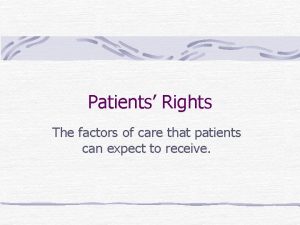UNC HEALTH CARE SYSTEM Caring for Transgender Patients













- Slides: 13

UNC HEALTH CARE SYSTEM Caring for Transgender Patients 1

UNC HEALTH CARE SYSTEM Summary Pronouns and Misgendering Deadnames Physical Assessment Respecting Transgender People Case Discussion and Questions 2

UNC HEALTH CARE SYSTEM What are Pronouns? Pronouns are how we acknowledge each other’s gender. • It’s an act of validating someone’s identity given uncritically if the person is cisgender • People often have difficulty respecting transgender people’s gender Examples include: • “She’s AOx 3. ” • “He was admitted for chest pain. ” • “They would like some pain medication. ” Using someone’s pronouns is an act of gendering a person, of building a shared socially constructed gender identity that influences how we relate to each other. 3

UNC HEALTH CARE SYSTEM Misgendering is a very painful thing to experience • It invalidates someone’s gender identity and is a fundamental sign of disrespect • Many people who misgender people do so on accident • Being frequently misgendered is a type of minority stress and a form of harassment • Transgender people are often misgendered as an attack on their identity and humanity Even cis people are misgendered. • This is especially true of gender non-conforming people, but everyone is subject to this How can you provide compassionate care and be a professional while misgendering your patient? 4

UNC HEALTH CARE SYSTEM They/Them and Neo Pronouns They/Them/Theirs are gender neutral pronouns that can be singular or plural • “They would like help going to the bathroom. ” • Singular, gender neutral and awesome • “This group discussion is great, but I can tell they’d really like to go to lunch right now. ” • Plural, gender neutral also awesome The first documented usage in the English language occurred in 1375 in a novel titled William and the Werewolf. • That’s 644 years of singular they/them. Mirriam-Webster added singular they/them this year in response to “changing” language usage Neo pronouns, like Xe/Xir, Mx, etc. , are to express gender that is outside of the of binary genders. • Just go with it. Using the correct pronouns costs nothing and shows that you respect they person you are addressing. 5

UNC HEALTH CARE SYSTEM So misgendering sucks. You’ve done it, now what?

UNC HEALTH CARE SYSTEM Getting it Right the First Time and Recovering From Mistakes The best thing to do is to gender people correctly the first time. But this isn’t always practical. • Some people are gender non-conforming • Some people are androgynous Use gender neutral pronouns and words first, then follow the other persons lead • They/them/theirs for everyone until they tell you their pronouns in some way • Use Folks, say partners, significant others, etc • Just ask people what pronouns they like • Say yours too! Having a hard time? • Apologize and move on quickly. Be sincere and don’t misgender them anymore. • Slow down • Be more intentional in your words. Think about what you’re saying before you say it. • Keep working on this. You’ve got this!! 7

UNC HEALTH CARE SYSTEM Deadnaming Names are heavily gendered. Because of this, many transgender people change their names. Old names are commonly referred to as Deadnames. Since names are heavily gendered, deadnaming is the same as misgendering. Tons of people use names other than their legal first names • Nicknames, pet names, last names, stage names, handles, etc. • We routinely respect cis people’s names. Just extend this to transgender people Don’t ask “What’s your real name? ” Instead, ask: • “Do you have a different name on your insurance? ” • “Have you gone by a different name? ” 8

UNC HEALTH CARE SYSTEM Physical Assessment’s are uncomfortable for everyone! So how can you be more sensitive and respectful? • Get consent! You should always get consent before touching someone or being invasive. • Ask how the person refers to their body parts. • For example, some transgender women may be dysphoric talking about their penis. Ask their preference. • Limit exams to what’s necessary. Ask yourself, do you need to do a genital exam? • Don’t expose people’s bodies! • Utilize privacy! Shut the curtain and door, close the blinds, etc. • Take it SLOW. Make sure to get feedback that things are ok. • If someone looks uncomfortable, ask them if they are ok. • Some people might get upset or dissociate. If this is the case, reconsider the medical necessity of the exam. All of these things will improve how you treat all patients – cisgender and transgender. 9

UNC HEALTH CARE SYSTEM Respect is Fundamental Respect everyone’s name, gender, privacy and humanity DON’T ask about genitals. DON’T ask how partners, family and friends “took it. ” DON’T ask about deadnames and old pictures. DON’T engage your curiosity! If you are unsure: Don’t ask, Don’t Tell! Give transgender people the respect you want. 10

UNC HEALTH CARE SYSTEM Stand Up to Transphobia Stand up for us. Don’t allow your co-workers or other staff to deadname or misgender us. Stand up to gossiping. Don’t talk about us being transgender with other people. Our gender shouldn’t be a topic of discussion. Only our nurse and doctor should know. If you hear something, say something. Fight back against a culture of ignorance, shame, intolerance and discrimination. A culture of tolerance and acceptance starts with you. 11

UNC HEALTH CARE SYSTEM Case Discussion - Layla is a 33 yo transgender woman who was admitted for complications related to priapism. • • • She has a dilaudid PCA running for pain control but still complains of severe pain. She has been having a lot of anxiety during this admission. Her medical history is significant for sickle cell crisis and miscellaneous personality disorder. Layla suffers from severe genital dysphoria and repeatedly stated she “wanted this thing gone. ” Layla repeatedly threatened to cut off her genitalia. Layla has not started transitioning. You were just assigned this patient and are about to see them. What do you do? 12

UNC HEALTH CARE SYSTEM Questions? Transgender Health Program – transhealth@unc. edu Shae Morrigan Bardgett, RN- Shae_Bardgett@med. unc. edu Katherine Croft, BSN, RN– Katherine_Croft@med. unc. edu Melissa Desiderio - Melissa_Desiderio@med. unc. edu 13
 Jean watson theory
Jean watson theory What does god say about transgender
What does god say about transgender Trans empowerment project
Trans empowerment project Lesbian symbol in genogram
Lesbian symbol in genogram Transgender umbrella
Transgender umbrella Transgender
Transgender Ihsa transgender policy
Ihsa transgender policy Mount everest riddle
Mount everest riddle Transgender
Transgender Cavaria genderkoek
Cavaria genderkoek What is transgender
What is transgender Transgender
Transgender Unc charlotte health center
Unc charlotte health center Factors of care patients can expect to receive
Factors of care patients can expect to receive
























